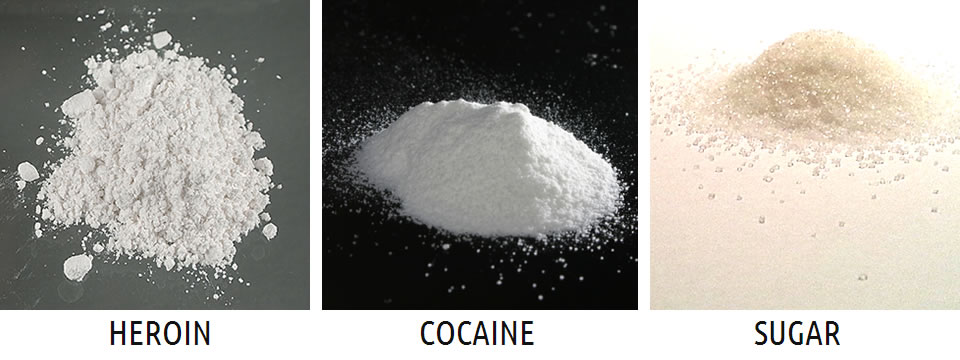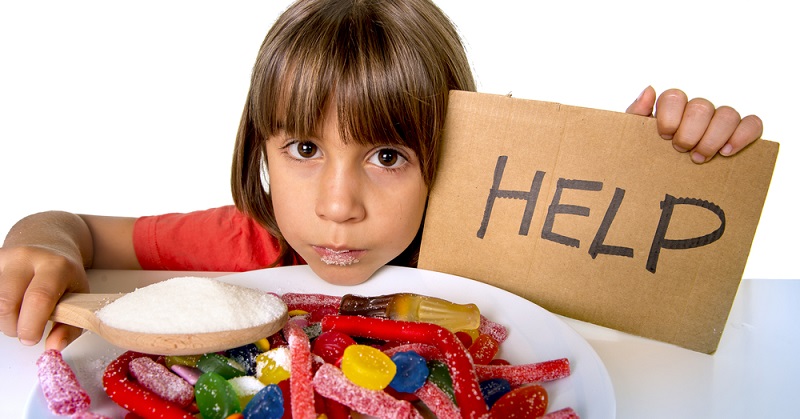Like other stimulants, such as caffeine or other drugs, it is possible that you can be addicted to sugar. In fact, sugar is highly addictive!
“Being addicted to sugar and flour is not an emotional eating disorder,” says Dr. Mark Hyman, author of The Blood Sugar Solution 10-Day Detox Diet. “It’s a biological disorder, driven by hormones and neurotransmitters that fuel sugar and carb cravings— leading to uncontrolled overeating. It’s the reason nearly 70% of Americans and 40% of kids are overweight.”
 Sugar: The Legal Drug
Sugar: The Legal Drug
“Animal studies have shown that refined sugar is more addictive than cocaine, heroin or morphine,” says Dr. Pamela Peeke, author of The Hunger Fix. “An animal will choose an Oreo over morphine. Why? This cookie has the perfect combination of sugar and fat to hijack the brain’s reward center.” Hyman believes sugar can be eight times more addictive than cocaine.
When you consume sugar, it acts the same way in your brain as substances like heroin and cocaine. Once it hits your system it triggers the production of dopamine in the brain. Dopamine is a neurotransmitter that is known as the “feel good” hormone. It gives you a sense of wellness and makes you feel good. This reaction is also the reason that people can become addicted to a substance.
So do you have a sugar addiction? See if this sounds like you:
1. You get defensive of your sugar intake.
You deny you have a problem or make excuses for it. You say you can give up sugar at any time – while you reach for yet another sugary soda. The truth is, sugar can find its way into a lot of foods and if you aren’t careful you can consume it, and even become addicted to it, without ever intending to. It is important to know the many faces of sugar and look for them in ingredient lists, then avoid those foods like the plague.
2. You have a hidden sweets stash.
You might think it is harmless, but if you feel that you have to hide that candy bar or those gum drops, then you might have a problem. Secret stashes of drugs, alcohol, and food, are very telling. If you feel like you have to hide it to keep from feeling embarrassed or being questioned about it, then you may need to seriously consider your relationship with food.
3. You eat even when you are not hungry because you crave certain foods.
Everyone has cravings from time to time, but when you are eating to satisfy those cravings even when you aren’t physically hungry, there is a problem. Before you pick up an unhealthy snack, stop and evaluate just how hungry you really are. Are you eating because you are genuinely hungry or because you just want the experience of tasting the food? Before indulging, drink a big glass of water or take a walk, then come back. If you still want the food, then the craving may be legitimate. Then again, it may not and you might have a serious sugar problem.

4. You continue eating certain foods even though you have health problems.
Your doctor has warned you that if you continue eating a certain way you will experience health conditions such as heart problems, diabetes, high blood pressure, and/or obesity. Even though you know this, you still cannot stop eating the foods that you know are bad for you. The same goes for social issues. If you can’t fit in the seat in a movie theater or people constantly make comments about your size – and these things keep you from socializing, this signifies problems that point toward addiction. You know you will experience negative consequences, yet you continue the behavior. That is a classic sign of addiction.
5. When you want to reward yourself, you do so with sugar.
You worked out pretty hard, so you decide you deserve a fancy sugar-laden coffee at Starbucks to reward yourself. You got an “A” on your exam so you head over to your favorite bakery and pick out the biggest, most chocolate-y dessert they have.
When food becomes a way of rewarding yourself, this can be a sign of a problem, especially when that food is sugar. People who are addicted to sugar may use a reward as an excuse to consume sugar, saying it is a “special occasion” or will happen “just this once.” If you find yourself doing this, check out some other things to use as a reward for your success.
If this list hits close to home, know that you are definitely not alone. Having the awareness that sugar is really a problem for you is the first step to breaking the addiction! Try slowly weaning yourself off, using natural low-glycemic alternatives like Stevia, Lakanto and fruit sugars whenever possible.
If you want to learn more about the damaging effect of sugar addiction, watch this amazing lecture video below by Dr. Robert Lustig, an American pediatric endocrinologist at the University of California, San Francisco.
For more inspiration and healthy recipes, check out
my other health blogs on DavidWolfe.com.
Click here to learn about my online school for Inspired Living!



